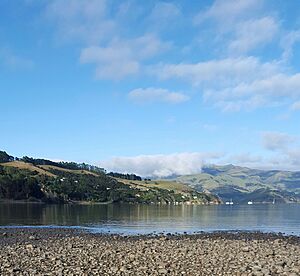Takamatua facts for kids
Quick facts for kids
Takamatua
|
|
|---|---|

Takamatua Bay
|
|
| Country | New Zealand |
| Region | Canterbury Region |
| District | Christchurch City |
| Ward | Banks Peninsula |
| Community | Te Pātaka o Rākaihautū Banks Peninsula |
| Electorates |
|
| Area | |
| • Total | 6.30 km2 (2.43 sq mi) |
| Population
(June 2023)
|
|
| • Total | 110 |
| • Density | 17.5/km2 (45.2/sq mi) |
| Postcode |
7581
|
Takamatua is a small town in New Zealand. It is located on Banks Peninsula, right by Akaroa Harbour. The main road to Akaroa, State Highway 75, goes through Takamatua. It is only about 3 kilometers north of Akaroa township.
A Look at Takamatua's Past
Takamatua was first known as German Bay. This name came about because some German families settled here in August 1840. This was around the same time the French settled in Akaroa.
Five German men chose to live in this bay instead of Akaroa. Their names were Breitmeyer, Hahn, Hettich, Waeckerle, Walther, and Woll.
In 1893, a business called the German Bay Dairy Co-operative Factory started here. This factory made cheese that won top awards. It won first prize at the Dunedin Agricultural Show in both 1901 and 1902.
The name of the bay changed in 1916. During World War I, residents wanted a more patriotic name. They asked the Minister for Internal Affairs, George Warren Russell, to change it to Takamatua.
Who Lives in Takamatua?
Statistics New Zealand describes Takamatua as a rural settlement. It covers an area of 6.30 square kilometers.
As of June 2023, , about 110 people live here. This means there are about 17 people for every square kilometer. Takamatua is part of the larger Akaroa Harbour area.
| Historical population | ||
|---|---|---|
| Year | Pop. | ±% p.a. |
| 2006 | 111 | — |
| 2013 | 135 | +2.84% |
| 2018 | 111 | −3.84% |
In the 2018 New Zealand census, Takamatua had 111 residents. This was a small decrease from the 2013 census. There were 45 households in the town. There were slightly more males (57) than females (54).
The average age of people in Takamatua was 61.8 years. This is older than the national average of 37.4 years. About 10.8% of residents were under 15 years old. Most people, 48.6%, were between 30 and 64 years old. About 37.8% were 65 years or older.
Most people in Takamatua, 94.6%, identified as European or Pākehā. Some residents also identified as Māori (10.8%) or Asian (5.4%).
When asked about their religion, 43.2% said they had no religion. About 37.8% were Christian. A small number followed Māori religious beliefs (5.4%) or Buddhism (2.7%).
About 18.2% of adults had a university degree or higher. The average income was $28,600. This was a bit lower than the national average of $31,800. Many people in Takamatua were employed. About 36.4% worked full-time, and 24.2% worked part-time.
Images for kids
 | DeHart Hubbard |
 | Wilma Rudolph |
 | Jesse Owens |
 | Jackie Joyner-Kersee |
 | Major Taylor |



